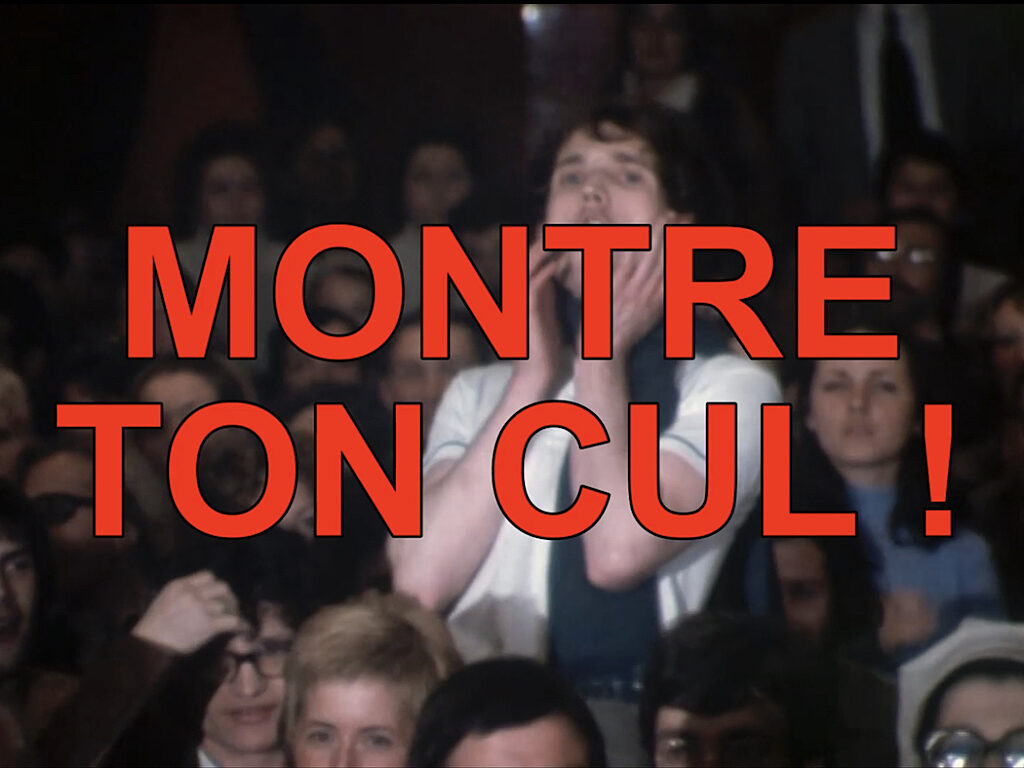Jeune cinéma!
’23
Art Cinema OFFoff
Lange Steenstraat 14
B-9000 Gent

Jeune cinéma © Local Films
Art Cinema OFFoff
Lange Steenstraat 14
B-9000 Gent
’23
Art Cinema OFFoff
Lange Steenstraat 14
B-9000 Gent
Between 1965 and 1983, the French seaside resort of Hyères hosted the Festival International du Jeune Cinéma. Filmmaker and programmer Yves-Marie Mahé tells the story of this rebellious and experimental Côte d’Azur counterpart to Cannes solely through archival footage from the time. The festival was searching for a different way of watching and presenting cinema. Hyères was a vivid space for passionate debates, incredible polemics and above all surprising encounters. Attendees included Chantal Akerman, Marguerite Duras, Werner Schroeter, Philippe Garrel, Leos Carax, Joris Ivens, Pierre Clémenti, Guy Gilles, Bulle Ogier, Bernadette Lafont, Sami Frey and André Delvaux, among many forgotten and to be (re)discovered names.
We’re screening one of the most remarkable films of the 1969 edition in its entirety: La Fée sanguinaire [The Bloodthirsty Fairy] by Roland Lethem (1942), one of the major figures in Belgian experimental cinema. Inspired by Buñuel, Cocteau, the Surrealists and the Japanese cinema of Suzuki, Honda and Wakamatsu, this Brussels filmmaker and writer was part of a movement of libertarian filmmakers from the heyday of Belgian cinema in the 1960s and 1970s, together with Noël Godin (the famous entarteur), Jean-Marie Buchet and Patrick Hella.
With this program, we don’t want to linger nostalgically in the past. Since 1999, the festival in Hyères has found an heir in the Festival des cinémas différents et expérimentaux de Paris (FCDEP), organized by the Collectif Jeune Cinéma (CJC) – a cooperative founded in 1971 on the model of The Film-Makers’ Cooperative in New York. Xavier García Bardón served on the jury during the recent, twenty-fifth edition (Oct. 11 – 15) and brings one of the award-winning films with him: Turtleneck Phantasies by Gernot Wieland, that also won one of the competitions at this year’s Oberhausen film festival. Wieland has a solo exhibition until January 28, 2024 at Argos, Brussels that distributes his films.
There will be a short break after the first film.
In the presence of Xavier García Bardón.
Xavier García Bardón teaches at the ULB and ERG (École de Recherche Graphique, Brussels). He’s an independent film programmer and member of the Ostend nomadic film platform Monokino. As film curator at BOZAR (2004−2020), he has worked with numerous artists and institutions. He has done extensive research on the history of the Knokke EXPRMNTL film festival, a subject to which he devoted his doctoral dissertation at the Université Paris 3 Sorbonne Nouvelle.
Yves-Marie Mahé
Jeune cinéma
Between 1965 and 1983, the Côte d’Azur town of Hyères hosted the Festival International du Jeune Cinéma. A timely event: the 60s saw an international explosion of productions labeled ‘young’, which needed its own sphere of dissemination and distribution, as only some of them made it into the middle ground of general releases and major festival presentations. The festival was documented thoroughly, from its first to last edition, enabling Yves-Marie Mahé to tell its story of lost illusions solely through archival materials. And what a fresco of splendours and miseries unfolds. They’re all there, the famous and the soon forgotten, the rowdy audience, the cynical bastards from the press, and the befuddled innocent bystanders wondering about all that hullabaloo. Marvel at the shows of genuine friendship as well as the insults people hurl at each other. Relish the glimpses of genius and dreck one gets offered. And be aware, this is not the story of one festival, but of a whole culture. (Olaf Möller)

Jeune cinéma © Local Films
Roland Lethem
La Fée sanguinaire
A voluptuous nude fairy attacks law, order and religion by choking a nun with her cross (after first arousing her by fondling her breasts), beating a uniformed official, gouging out a boy’s eyes for threatening her with a toy gun (she licks off her bloody fingers afterwards) and, finally, methodically castrating a student because he studies law. A pan along a shelf reveals the meticulously bottled penises of Ngô Đình Diệm, Martin Luther King, Kennedy, Johnson and De Gaulle. At the end, two angels deliver her in a barrel to a new destination: the Belgian Royal Palace. The swastika that opened the film changes into Nixon. (Amos Vogel)

La Fée sanguinaire © PBC Pictures
Gernot Wieland
Turtleneck Phantasies
Turtleneck Phantasies is a poem that comes to us in fragments. This work is dedicated to the murmuring, the illegible, the unspeakable, the sketches and doodles, fragments of childhood memories, the absurd moments. In other words, all the little forms that are so central to our relationship with the world, but are given relatively little attention. The film tells the story of a German writer who spent over 30 years in psychiatric institutions tattooing words and (mostly illegible) texts and drawings on the skin of his fellow inmates.

Turtleneck Phantasies © Argos